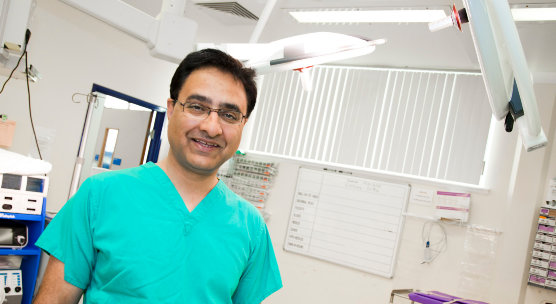Blood pressure tablets offer radiotherapy protection for prostate cancer patients
Published On Thu 22 Oct 2015 by Roddy Isles

Blood pressure medication could help protect men from complications arising from radiotherapy for prostate cancer, a new study by researchers at the University of Dundee has found.
Radiotherapy is an established treatment for cancer which has been confined to the prostate gland. However, the treatment can cause collateral damage to other parts of the colorectal region. This can result in bleeding and increased toilet visits and has also been observed to be a risk factor for other colorectal cancers.
Ghulam Nabi and colleagues in the School of Medicine at Dundee analysed outcomes for over 300 patients who had undergone radiation therapy for prostate cancer.
They found that a group of patients who were already taking Angiotensin Converting Enzyme Inhibitors (ACEIs) blood pressure tablets - such as captopril - showed a lower risk of the complications arising after treatment, in comparison to patients who were not on the same medication. Where complications did occur, they did so for shorter periods of time.
102 of the patients examined were hypertension sufferers who were taking ACEIs at the time of their radiotherapy. Follow up examinations in the ensuing seven years found no follow-on side effects in 68 of them, and only low levels in another 30.
By contrast, for those patients not taking ACEIs, whether hypertension sufferers or not, the numbers showing side effects were significantly higher, with upwards of 30 per cent of patients showing medium-to-serious side effects.
“It has always been an unfortunate side effect of radiotherapy that it can cause collateral damage to healthy tissue and in the case of prostate cancer that often brings about these distressing side effects,” said Mr Nabi, Clinical Head of the Division of Imaging and Technology at the University.
“What we have found is that men on these specific high blood pressure tablets had a lower incidence of damage. These findings could have a huge influence for patients facing radiotherapy for prostate cancer as currently there is no effective cure for these side effects.
“These results improve our understanding of the side effects and can also help us to explore the mechanisms behind it. We are now hoping to do a further study looking at what happens with different doses of these drugs.”
The results of the study have been published in the International Journal of Radiation Oncology.
For media enquiries contact:
Roddy Isles
Head of Corporate Communications
University of Dundee
Nethergate, Dundee, DD1 4HN
Tel: +44 (0)1382 384910
Mobile: 07800 581902
Email: r.isles@dundee.ac.uk